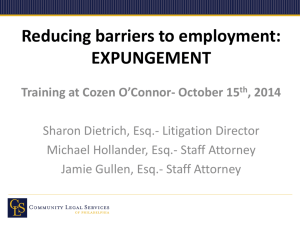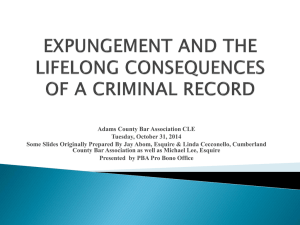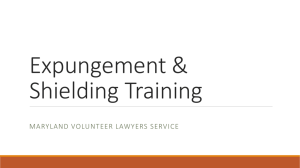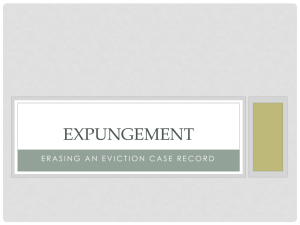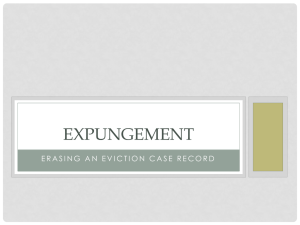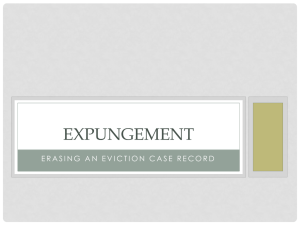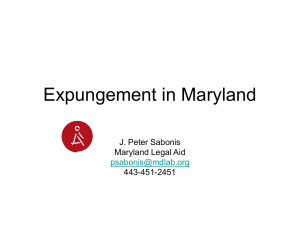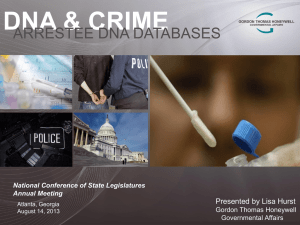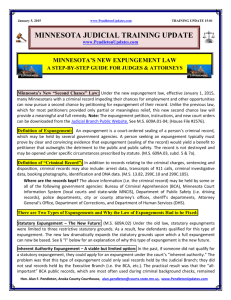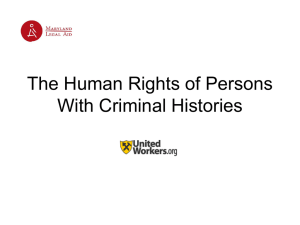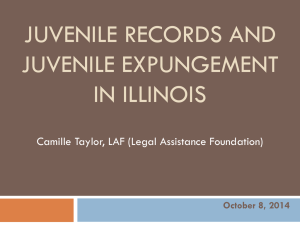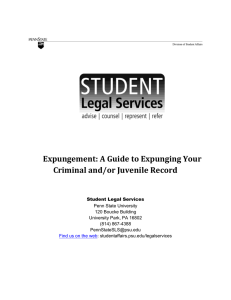Cozen Training
advertisement
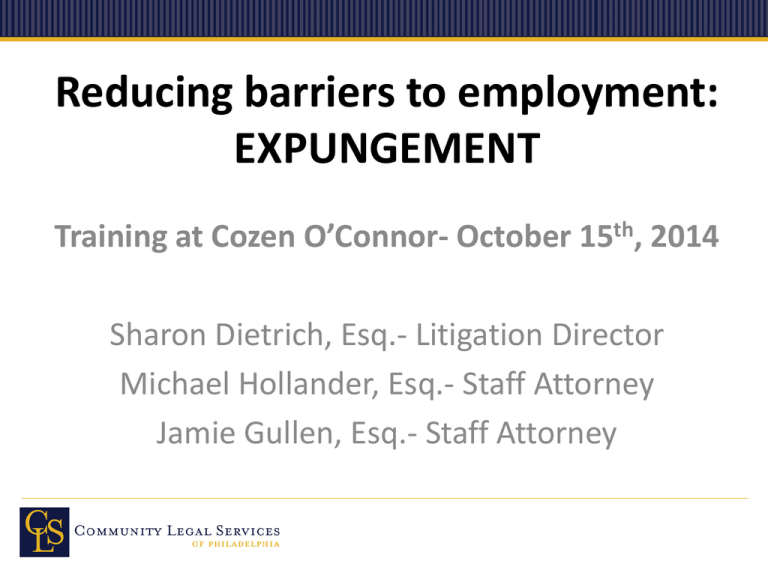
Reducing barriers to employment: EXPUNGEMENT Training at Cozen O’Connor- October 15th, 2014 Sharon Dietrich, Esq.- Litigation Director Michael Hollander, Esq.- Staff Attorney Jamie Gullen, Esq.- Staff Attorney Agenda • Overview- how expungements help our clients become employed • Explanation- what can be expunged and how – Substantive law – Procedures for filings, hearings, etc. • Demo- how to find criminal records, draft expungement petitions, and file with the courts • Questions Why Clear a Criminal Record? • USDOJ estimates 100 million American adults, or 1 of 3, have a record. • Applying this ratio to Philadelphia, conservative estimate of 400,000 people. • 2011 Arrest Statistics in Philadelphia • 61,032 arrests with 354,951 charges • 52,193 charges ended in conviction (15%) Why Clear A Criminal Record? • Though “innocent until proven guilty,” non-conviction charges remain on a criminal record until expunged. – Courts sell this data to background check companies who sell it to employers. – Society for Human Resource Management study: 87% of employers look at criminal records when hiring. • Under PA and federal law, employers should NOT consider arrests without convictions, but they often DO. CLS Employment Unit Intakes 2000-2013 1800 1600 1400 1200 1000 800 600 400 200 0 2000 2001 2002 2003 2004 2005 2006 2007 2008 2009 2010 Year Intakes Number of Criminal Record Intakes Rejections 2011 2012 2013 Expungement Movement • Whether someone has been convicted or not, clearing up a record as much as possible is KEY to helping people become employed. • We have had many clients who have been able to get jobs after an expungement. • The need is HUGE and the more we can expand expungements the more we help lift individuals and communities out of poverty. What is on a criminal record? • Convictions: plea agreements & guilty verdicts • Charges resulting in a not-guilty verdict • Charges that were dismissed, withdrawn, etc. • Charges resulting in a diversion program like Section 17 or ARD • Juvenile adjudications- in some cases may stay on record Non-Conviction Dispositions Disposition Definition ARD/Section 17 Pre-trial diversion programs. After completing requirements, participant (usually) receives completion letter and should attach letter to petition for expungement. Withdrawn Motion by the Commonwealth to remove the charge(s) from a bill of particulars. Usually made when witness fails to appear. Dismissal Motion granted by Judge for a variety of reasons, including lack of evidence and lack of prosecution. Nolle Prossed Pa.R.Crim.P. 585 – Voluntary withdrawal of charges by the DA (legally speaking for a lack of evidence). Not Guilty A finding of non-culpability following a trial before Judge or Jury. Acquittal A finding that the Commonwealth failed to carry its evidentiary burden that a crime was committed or that the defendant was involved. Conviction Dispositions Disposition Definition Guilty A finding of culpability against the defendant following a trial before a Judge or Jury. Guilty Plea A defendant’s formal answer in court to the charge(s) admitting that he or she did in fact commit the offense(s) listed. Nolo Contendere A defendant’s formal answer in court to the charge(s) stating that he or she will not contest the charge(s), but neither admits guilt nor claims innocence. Grading of offenses Felonies Misdemeanors Summaries • Most serious • May include: • Less serious • May include: • Least serious • May include – Aggravated assault – Simple assault – Drug dealing – Burglary – Robbery – Drug possession – Some types of theft – Traffic citations – Low-level retail theft –Disorderly conduct Where Can You Find Criminal History Record Information? • Court records: available for free online at https://ujsportal.pacourts.us/docketsheets.aspx • PA State Police Report ($10 fee) • FBI Record ($36 fee) • Report from private background check companies Eliminating Criminal Record Information • Expungement: Completely remove an arrest from a criminal record. Generally only for non-conviction charges. • Redaction (partial expungement): Removal of non-conviction charges only from an arrest where some charges resulted in a conviction. The conviction(s) will remain on the record. • Pardon: The process by which felony and misdemeanor convictions may be expunged from a criminal record. Cleaning Up Your Record: Expungement • Expungements: A relatively short process (approximately 6-10 months) • Under 18 Pa. C.S.A. § 9122, expungement is possible for: • Non-convictions (charges withdrawn, dismissed, nolle prossed, or not-guilty) • ARD/Section 17 if the program was completed • Summary convictions if arrest-free for five years • Felony & misdemeanor convictions if you are 70+ and have been free from arrest for 10 years Sample CHR (Expungement) Sample CHR (Redaction) Redaction/Partial Expungement Sample CHR (Redaction) Redaction/Partial Expungement Can’t be expunged Sample CHR (Redaction) Redaction/Partial Expungement Can be expunged Drafting and Filing Expungements • An expungement petition and order must be created for each case you want to expunge/redact. • Pa.R.Crim.P 490 & 790 list what information is required- but we have automated the process through the expungement generator. • Once the petitions and orders are drafted and you have reviewed them for accuracy, they can be efiled with the court. What Happens After Filing? • Just because someone is eligible to have a record expunged does not mean it will be expunged. • The District Attorney is given an opportunity to object to all expungement petitions at a status listing before a trial commissioner. – If the DA does NOT object, the petition is granted. – If the DA does object, the case is listed for a hearing before a judge. Legal Standard Commw. v. Wexler, 494 Pa. 325 (1981) – At the hearing, the DA has the ultimate burden and must present specific compelling evidence justifying the retention of the record. – If they do so, then the DA’s interest is balanced against the petitioner’s right to expungement. Legal Standard Cnt’d Under Wexler, the court must weigh several factors including: – Strength of the Commonwealth’s case and reason for wanting to retain the record – Criminal record history of petitioner – Age and employment history of petitioner – Adverse consequences to the petitioner caused by the record Exceptions to this general framework: – Charges that resulted in “not guilty” or “dismissed for lack of evidence” should almost always be expunged. • Commw. v. D.M., 695 A.2d 770 (Pa. 1997) • Commw. v. Rodland, 871 A.2d 216 (Pa. Super. Ct. 2005) – Charges associated with a guilty plea: DA has to prove by “clear and convincing evidence” that the charges were dropped in exchange for pleading guilty. • Commw. v. Lutz, 788 A.2d 993 (Pa. Super. Ct. 2001) Common Objections • The DAs tend to object if the charges were “serious,” “recent,” or if there are multiple cases that show a “pattern of criminal behavior.” – None of these are legally recognized objections. • To show a “pattern of behavior” under the case law, the DA must prevent evidence of a modus operandi. – See Commw. v. McKee, 516 A.2d 6 (Pa. Super. Ct. 1986). • If petitioner is on probation or owes court fines and costs- may complicate case. After Expungement Is Granted • Orders are sent to us (and we send to client) – Expunged information comes out of court system quickly • Court sends orders to the PA State Police and Phila Police who then expunge their records – Confirmations are sent to us (and we send to client) – This process can take up to six months or more Demonstrations • How to review and download criminal records online. • How to draft expungement petitions using the Expungement Generator • How to e-file expungements and request hearing dates. • For an in-depth demonstration: – https://www.youtube.com/watch?v=7iT5pXGIOzc
